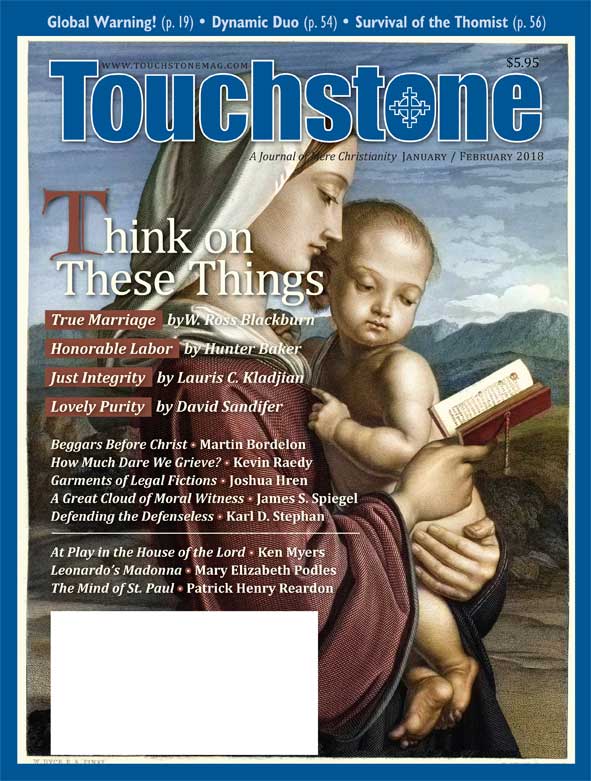Review
Dynamic Duo
Man Up! The Quest for Masculinity by Jeffrey Hemmer
Concordia Publishing House, 2017
(315 pages, $14.99, paperback)
Man of the House: A Handbook for Building a Shelter That Will Last in a World That Is Falling Apart by C. R. Wiley
Wipf & Stock, 2017
(139 pages, $20.98, paperback)
reviewed by S. M. Hutchens
Years ago I encountered the derisive epithet "genital theology" among the nastier members of the women's ordination crowd. It represented the reactionary antithesis of what I have elsewhere called "functionalism," and they meant it to ridicule the idea that the "penis makes the pastor," in favor of the notion that if a woman can do everything a man can by way of ministerial work—preach, preside at the Lord's Supper, lead the flock, and so forth—then, given the equality of men and women taught in the Bible and the priesthood of all believers, there is no substantive theological bar to her doing so. There is, these people believe, no meaningful symbolism in maleness by which Christian belief and practice should be influenced, much less controlled—an idea that pervades religious egalitarianism, beginning with its foundational denial of the significance of the maleness of God Incarnate, which they expunge by substituting his humanness for it.
I have noticed the same bunch does not have much of a problem with the signification of femaleness, for they typically speak of the womb, the breasts, of nursing and nurturing, of openness, inclusion, peacemaking, receptiveness, and the like, as female characteristics of God which are symbolized preeminently in the Church. Churches with heritages that dull their senses to the symbolism that surrounds them—of one thing that stands for another—are not likely to see placement of a woman at pulpit and altar as root and branch denials of the Christic nature of the apostolic ministry, and thus of Christ himself. There may be a flash of recollection among Bible-readers that the Passover Lamb symbolizes Christ, and must be a perfect male. But their sensibilities have been so drowned in the egalitarianism that surrounds them, that a connection between the maleness of the Lamb, of Christ, and the New Testament presumption of maleness in the leaders of churches and families is something more than the head can hold.
As a Lutheran pastor, Jeffrey Hemmer is well-placed to explain the genital theology of the Christian Church, for the Lutherans, like the Catholics, as mysterious as they are to this writer, never, to their credit, lost the ability to see (as many Protestants did) that we residents of the visible world are bound to the invisible in a complex of meaning mediated by things here that stand for things there and mediate them to us. Lutherans who have kept their Lutheranism have not developed a base intuition of symbolic nullity that allows them to digest the idea that the maleness of Christ and its echoes in creation can be smudged into a sexless humanness. When they write books with titles like Man Up! they have more in mind than an admonition to act "more masculine," but speak from a tradition that understands horns being exalted, little fingers being thicker than loins, and "Rise Up, O Men of God" before it was emasculated by the pantywaist ignoramuses who replaced "Men" with "Church." There is much more in his book than this, since it is at base an encouragement to follow Jesus. But Hemmer's Jesus looks like the real one, which is to say, the Lord, who can be described, but not formulated.
Productive Property
C. R. Wiley's Man of the House reads less like a theology and more like a vade mecum, composed of mature and biblically informed observations on household economy in the broadest sense, and the place of the husband and father in the life of the home and family—all very down-to-the-dirt and practical. I found the chapter on property especially interesting, for my own thoughts on a growing concern in our day has been how can one dissociate to a maximal degree from the control of a society that is becoming ever more uncongenial to those who would be free to live a Christian life.
This business is fraught with so many problems that the temptation is to give up on solving them before one even begins. The owning of property (at least as long as that is permitted to Christians) is a significant part of the answer, and I think Wiley is on the right track in his discussion of the ownership of productive property, which he presents as a series of challenges to be overcome, but in doing so he reduces overwhelming perplexities to something comprehensible and potentially manageable, something that one can think about productively and plan into. Here is the right context for speaking about wealth: Wiley reminds the reader that if one wants to give, he must first get, and honest getting is nothing to be ashamed of.
Once again, there is much more than this in the book (the Foreword is by Lee Podles, the Afterword by Allan Carlson), and I also commend it to our readers. It would be especially helpful for young men, I think, and can be read profitably as a practical supplement to Rod Dreher's Benedict Option. It is blessedly free of preachiness, and although I rarely recommend books to reading groups, since I don't much like them myself, this one would form a good nucleus for a meeting of younger and poorer and older and richer men, for one of the tasks of the older men of the church is to help the younger get richer in more ways than one.
S. M. Hutchens is a senior editor and longtime writer for Touchstone.
subscription options
Order
Print/Online Subscription

Get six issues (one year) of Touchstone PLUS full online access including pdf downloads for only $39.95. That's only $3.34 per month!
Order
Online Only
Subscription

Get a one-year full-access subscription to the Touchstone online archives for only $19.95. That's only $1.66 per month!
bulk subscriptions
Order Touchstone subscriptions in bulk and save $10 per sub! Each subscription includes 6 issues of Touchstone plus full online access to touchstonemag.com—including archives, videos, and pdf downloads of recent issues for only $29.95 each! Great for churches or study groups.
Transactions will be processed on a secure server.
more on fatherhood from the online archives
more from the online archives
calling all readers
Please Donate
"There are magazines worth reading but few worth saving . . . Touchstone is just such a magazine."
—Alice von Hildebrand
"Here we do not concede one square millimeter of territory to falsehood, folly, contemporary sentimentality, or fashion. We speak the truth, and let God be our judge. . . . Touchstone is the one committedly Christian conservative journal."
—Anthony Esolen, Touchstone senior editor












